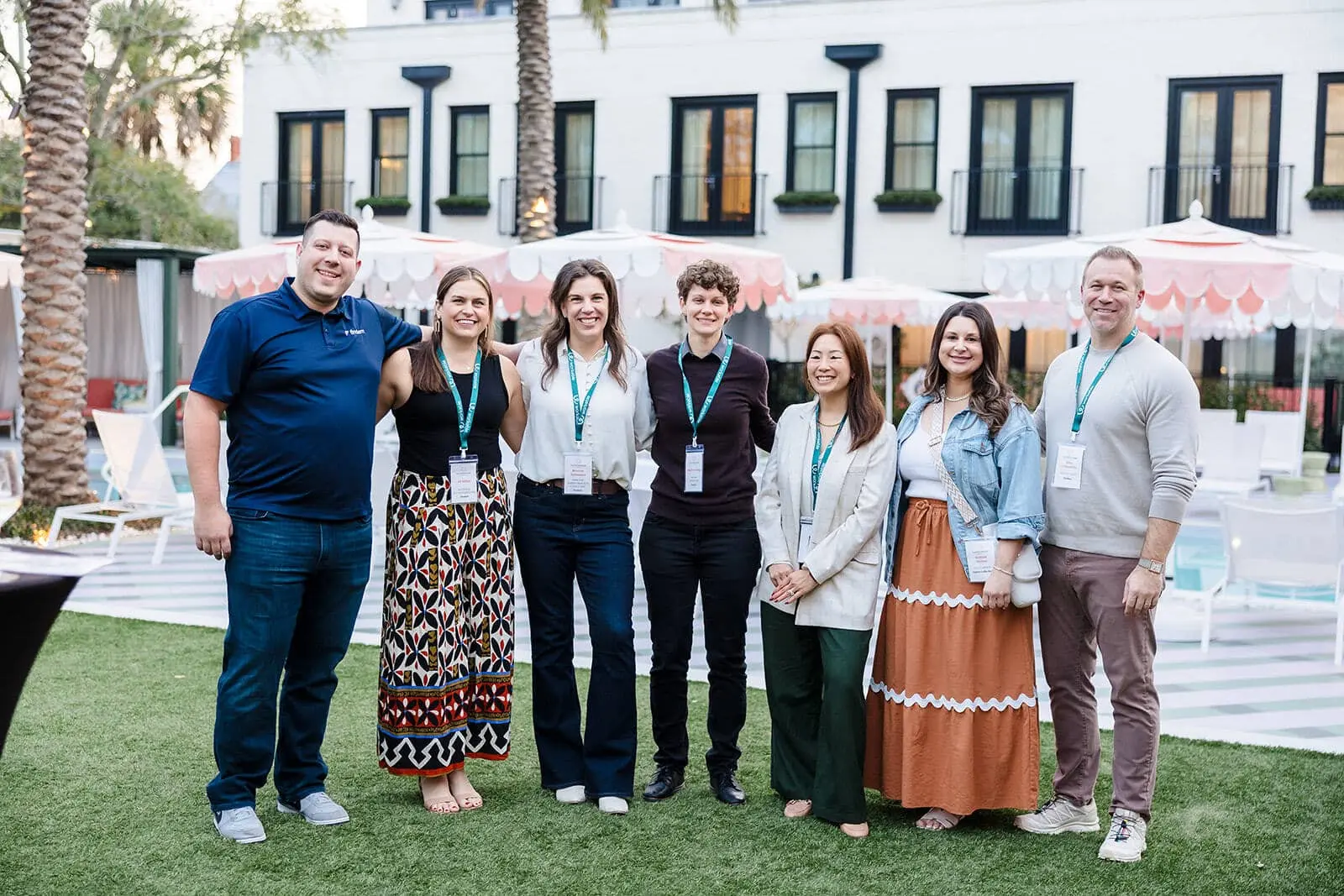.svg)
Why generic AI doesn’t work for hiring – and what to look for instead
.svg)

A much-talked-about lawsuit has put the risks of using AI in hiring under a microscope. In Mobley v. Workday, Derek Mobley claims Workday’s AI-powered applicant recommendation system had a disparate impact on candidates based on race, age, and disability. Now, Workday must disclose which customers use its AI features.
While the outcome of this case is still uncertain, the takeaway is clear: AI in hiring comes with risk — and the risks multiply when companies rely on generic AI instead of specialized recruiting AI.
“If you think your solution can be done for everybody, it’s not going to be good for anybody,” said Larry Cummings, co-founder of HR Tech Alliances
Most talent teams today are still relying on generic AI. Here’s why that approach is failing, and what to demand from specialized solutions built for recruiting.
The promise vs. reality of generic AI in recruiting
Generic AI systems are built for breadth, not depth. As VE3 explains, they are “large-scale systems designed to perform a wide array of tasks across multiple domains. They are built on vast datasets and can be fine-tuned for various applications with minimal adjustments.”
In practice, these systems promise:
- Versatility: Handling many tasks with one model
- Ease of deployment: A single system for multiple environments
- Consistency: A common interface across applications
But the reality is different. These models require massive data and compute resources and struggle with domain-specific tasks unless heavily fine-tuned. So, why is it falling short?
Data quality issues
Generic AI doesn’t have the kind of data about the legal profession, for example, as the legal technology company Harvey AI. Or in the financial services field, for example, Microsoft Copilot “has zero access to proprietary financial databases, cap tables, or private market information...Copilot can't generate the comprhensive reports that investment professionals need.”
Contextual blind spots
Data analyst Kevin Webster ran an experiment, padding a waiter’s résumé with financial jargon like “Prepared beverages for a clientele that included MBAs, CFOs, and finance analysts — exposing me to real-world conversations about credit ratings, mergers & acquisitions (M&A), and working capital cycles.”
The résumé scored a 92/100 from Grok-fast, which justified the high score by claiming overhearing finance conversations was equivalent to years of experience. Webster observed, “I think Grok kind of went way too far with ‘I don’t want to appear opinionated, I’ll be a yes man and say everyone is very well qualified’ and not have a viewpoint almost.”
Bias replication
Data scientists have pointed out that in healthcare, bad data can lead to incorrect diagnoses or inappropriate treatments. In finance, it can penalize underrepresented groups undergoing credit checks, exacerbating financial inequalities.
Raghav Singh, a disabilities advocate, warns a similar pattern for hiring: “Apple’s research shows LLMs can’t generalize well beyond what they’ve already seen. In hiring, that means if past hiring favored Ivy League grads, AI will too. If women or disabled candidates were overlooked historically, AI learns to replicate that. If ‘culture fit’ meant sameness, AI reinforces the same narrow mold.”
For HR leaders, he says, this has serious implications. “AI won’t automatically remove bias — it can amplify it. You may think decisions are more objective, but the bias is just hidden deeper in the code. Regulators are increasingly scrutinizing AI-based hiring for these very risks.”
A case study in AI failure: Amazon's experimental recruiting alogrithm
The most well-known example is Amazon. As Reuters reported, its experimental recruiting algorithm, trained on a male-dominated applicant dataset, “effectively taught itself that male candidates were preferable … penalizing CVs that included the word ‘women.’” Amazon ultimately scrapped the system.
For HR leaders, the message is clear: generic AI doesn’t just fail — it can actively amplify risk.
Five critical ways generic AI fails in hiring
Inadequate data foundation
A data foundation is the infrastructure and processes in place that ultimately affects your ability to collect, store, manage, and use data. And smart AI starts with smarter talent data.
Without structured, recruiting-specific data, AI fails at accurate matching. Frontier Enterprise found that poor data foundations prevent 4 out of 5 companies from realizing AI’s potential: “Business leaders have high hopes that artificial intelligence investments can drive market-changing innovations to transform everything from customer satisfaction to product innovation. A poor data foundation is holding 78% of organizations back from achieving these goals."
Lack of domain expertise
As Harvard Business Review explains, “generalist models are democratic in the worst possible way. They treat all information equally, potentially weighing irrelevant details as heavily as crucial professional findings.”
Similarly, recruiting firm Carv challenges people to imagine how teams in the future will leverage AI in everything from screening resumes to assessing candidate fit.
"Now, if we bring in GenAI, it will be able to extract information from resumes or interviews in real-time, understand details about experience, education and skills, and assist in screening candidates. Convenient, right? However, fully understanding the industry specifics, as well as the subtleties of job roles, is something that generic GenAI is not capable of…The price being paid for that is time, and thus money, but also: trust.”
Bias amplification without safeguards
Singh further notes: “Engagement-driven algorithms reward outrage and shock…A viral LinkedIn post criticizing ADA ‘overreach’ is far more likely to dominate attention than a thoughtful article on inclusive hiring best practices. Over time, these skewed narratives normalize exclusionary thinking and reinforce damaging stereotypes.”
He cites a 2024 University of Washington study showing that adding disability-related awards to an otherwise identical résumé actually lowered its ranking in GPT-4’s screening. “Biased data trains biased models,” he says, “which in turn produce biased outcomes, further reinforcing discriminatory practices.”
Poor workflow integration
Generic AI doesn’t plug seamlessly into recruiting processes like job description creation, sourcing, or ATS rediscovery — slowing teams down instead of accelerating them.
Absence of compliance framework
As Harvard Business Review warns, “generalist models, despite their impressive capabilities, remain largely opaque in their decision-making processes.” This opacity has legal consequences: the U.S. EEOC sued iTutorGroup after its AI automatically rejected older applicants, leading to a $365,000 settlement.
What to look for in specialized AI hiring solutions
Purpose-built data architecture
Generic AI can make it difficult to find people who match your open jobs, and it can cause hallucinations. Consider a search for “give me a list of senior Java developers in the Bay Area with startup experience.” You might receive a response like, “Sorry, I cannot provide a list of specific people or directly connect you …” followed by sourcing strategies.
A strong, specialized AI solution, on the other hand, may be able to provide a list. It will have a strategy for protecting people’s personal data and delivering results with a high level of confidence and relevant context to be useful.
Industry-specific training and algorithms
Carv describes specialized AI as AI crafted for one primary use case or domain to meet the needs of a specific industry, such as healthcare, finance, or recruitment, and deeply embedded with domain-specific knowledge.
This delivers higher accuracy and relevancy, as long as you’re asking it questions about that field. Carv says that specialized AI “is designed to perform a specific task or task domain extremely well. In contrast to GenAI, specialized AI can be fine-tuned, and it’s able to understand the context more deeply because of it.”
Built-in bias detection and mitigation
Responsible AI reduces reliance on narrow signals like past employers or elite schools. Findem’s AI uses attribute-based matching across 100,000+ sources, showing how different attributes affect talent pool diversity and surfacing qualified candidates often missed by keyword-only systems.
Seamless workflow integration
Advanced AI embeds into every recruiting step: multichannel campaigns, inbound application review, ATS rediscovery, referral surfacing, alumni and passive candidate sourcing, and attribute-based search.
Recruiters can ask embedded AI assistants context-specific questions such as: “How much did this company grow during the candidate’s tenure?” or “How should I pitch this candidate to the hiring manager?”
Regulatory compliance features
Specialized AI ensures privacy and compliance with EU regulations and U.S. state laws (e.g., New York, Colorado), protecting companies from legal exposure.
Specialized vs. generic AI: the tangible difference
Ed Crook, VP Strategy & Operations at DeepL, writes: “Specialized models are the real ROI driver in 2025. General models have limitations, especially for business use cases…In contrast, specialized AI models are tailored to specific industries and use cases, trained on domain-specific data and optimized for specific tasks.”
Benefits include:
- Higher accuracy and efficiency
- Regulatory compliance
- Diversity and inclusion outcomes
- Customization for enterprise needs
Specialized AI is no longer optional
Generic AI can write recipes or generate images, but hiring carries far higher stakes. Misapplied AI reinforces bias, blocks diversity, and creates compliance nightmares.
Specialized recruiting AI, by contrast, enables faster, fairer, and more inclusive hiring. With Findem’s platform, powered by unique 3D data, talent teams can finally trust AI to deliver real outcomes.
👉 Ready to see the difference? Book a demo with Findem and learn how specialized AI transforms your hiring process.





